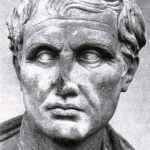Bees were special and peculiar to the ancients. Their presence in the myth dates back to times much earlier than Rome. They were of considerable importance in Egyptian and Minoan beliefs. Then they fascinated authors such as Publius Virgil Maro or Pliny the Elder. The bees had a divine element in them and were surrounded by a mystical aura of mystery. It is best expressed by the so-called Bugonia ritual.
It was common in the ancient world to believe that bee swarms were born from the bodies of dead bulls. This is where the aforementioned name comes from – Bugonia, in Greek βοῦς, meaning cattle, and γονή, gonad – means so “born from cattle”. This ritual, as a natural or man-made event, was aimed at creating or restoring a bee swarm. In the literature of the Roman period, we have much evidence of this process. One of the most famous is the one from Book IV of Georgics Virgil:
Sudden and wondrous to tell — throughout the paunch, amid the molten flesh of the oxen, bees buzzing and swarming forth from the ruptured sides, then trailing in vast clouds, till at last on a treetop they stream together, and hang in clusters from the bending boughs1.
The birth of bees also has a religious significance in a deeper context. The Romans believed they were born from the souls of deceased farmers and other hard-working people. In another work by Virgil, Aeneid, in book VI, the father of the title character Aeneas, Anchizes in Hades, addresses the issue of metempsychosis (Greek for the journey of souls), i.e. a kind of reincarnation. Intriguingly, he talks about it to his son as he watches bee swarms in charming groves near the Lethe River (one of the five rivers of Hades that caused memory loss when drinking).
Hence the great respect of the Romans for bees. Ancient beekeepers cared for their proper treatment. Pliny the Elder advised, for example, that “people must wash clean before they take the honey”2. These animals also appeared to be human for purely experimental reasons. The organization of the swarm and diligence were admired. For some, such as the aforementioned Pliny, they were even a model of an ideal society worth imitating. The Greek philosopher Plato was rather not inspired by bees when writing his State, but ancient authors found similarities between the Platonic politea system and the bee swarm.







